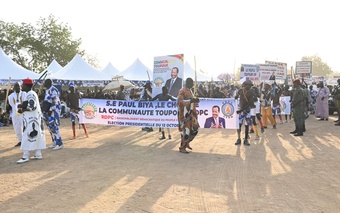PC: Paul Biya/X
By Richard Hakim
Cameroon is slated to hold its next presidential election on 12 October 2025. That date was formally set by a presidential decree earlier in July 2025. Because of a series of prior decrees, Cameroon’s electoral calendar has shifted: the terms of municipal councillors and parliamentarians were extended beyond their original expiry dates in order to “lighten the electoral calendar.”
This move has drawn criticism from opponents and constitutional scholars, who argue these extensions stretch constitutional norms and weaken accountability. Under Cameroon’s electoral rules, the presidency is decided by a single-round, first-past-the-post system (i.e. no runoff). The candidate with the most votes wins.
At the heart of the 2025 contest is Paul Biya, who has held the presidency since 1982. In 2008, a constitutional amendment removed presidential term limits, enabling him to seek re-election indefinitely.
In July 2025, Biya officially announced his bid to extend his rule into an eighth term, citing what he described as “insistent calls” from citizens.
At age 92, he is among the oldest heads of state globally, and persistent speculation about his health, capacity, and potential absences have underscored much of the political discourse.
His campaign appearances have been rare; one of the more public ones took place in Maroua in the Far North region, where Biya pledged to address regional grievances, insecurity, and development deficits. The durable structure of patronage, entrenched networks of influence, the alignment with traditional authorities, and the tight grip over the state apparatus all work in his favor.
One of the defining features of the 2025 election is the fractured opposition. Eleven candidates are challenging Biya, but the absence of a unified front has raised doubts about their ability to offer a serious, coordinated alternative.
Most challengers are former allies or insiders who have broken with the ruling coalition, but lack broad, independent bases.
Among the new high-profile entrants is Issa Tchiroma Bakary, a former government spokesperson, who in mid-2025 formally declared his candidacy and began to criticise Biya’s governance and claims of excessive dependence on foreign aid. Also notable is Cabral Libii, who had placed third in the 2018 election, and Bello Bouba Maigari, a former prime minister and longtime political stalwart.
In contrast, Maurice Kamto, the main opposition leader in 2018 and second-place finisher then, has been barred from contesting in 2025 by the electoral commission and that exclusion was upheld by the Constitutional Council.
Human Rights Watch and international observers have denounced this as a blow to the credibility of the process. The exclusion is justified by authorities on procedural grounds, including “multiple investments” under different party labels.
To contest, prospective candidates must submit their applications within a narrow window. A tall list of 83 aspirants was whittled down by the electoral commission to a vetted list of 13 candidates. The disqualifications and screening processes have become flashpoints, particularly in the Kamto case.
Beneath the political and institutional drama are deep structural challenges in Cameroonian society that shape voter sentiment. Youth unemployment is high, and many young people perceive that the political system is closed and unresponsive to their aspirations.
In the English-speaking Northwest and Southwest regions, the long-running Anglophone crisis continues to fester, with periodic violence, school disruptions, and displaced populations. In the Far North, Boko Haram militancy and cross-border instability remain persistent threats.
Infrastructure deficits, health service gaps, and inequitable regional development heighten discontent, especially in rural zones. Many analysts argue that even if the formal institutions remain skewed in favour of incumbency, elections still matter symbolically as a barometer of popular discontent and a focal point for civic mobilisation. However, the perception among many is that the outcome is preordained, which can lower turnout or drive protests.
The 2025 Cameroonian election presents a complex mix of continuity, challenge, and latent uncertainty. On paper, the elements favour the entrenched president: institutional control, fragmented opposition, and a political culture accustomed to strong executive rule. Yet, beneath that surface lie discontented demographics, structural inequities, and an evolving civic consciousness that may increasingly question the legitimacy of a system that appears closed.
Even if the formal mechanics deliver another Biya victory, the broader contest is over legitimacy, inclusion, and whether electoral politics can evolve from ritual reaffirmation into a space for meaningful change. In that sense, October 2025 may not simply decide who wears the presidential sash next, but whether Cameroon edges closer, or further, to the possibility of deeper democratic systems.
Editing by Peter Agbesi Adivor
Africanelections.org


 Take Voters' Compass
Take Voters' Compass